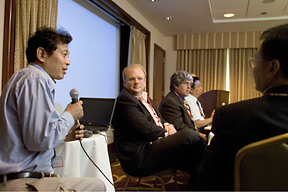Visit from Peking University delegation affirms CAPS-Beida cooperation
By Franklin Crawford

For a few tense hours on July 9, the Peking University (Beida) delegation and several members of Cornell's China Asia-Pacific Studies (CAPS) program were deeply divided. The scholars from Beida, led by deans Wang Jisi and Jia Quingguo '88, had sided with the Italian team in the World Cup final. "I and several others from Cornell hoped that the French team would prevail," said Chen Jian, Cornell professor of history and director of CAPS. "So the result disappointed us. But when we got back to business related to CAPS and CAPS-Beida cooperation, we found that we were unified again."
Beida (beh' DAH ) is a Chinese shorthand term for Peking (or, depending on who or where you are, Beijing) University.
The World Cup party, held during a retreat at Geneva-on-the-Lake, was a pleasant counterpoint to more serious matters that prompted the unprecedented visit of nine members from Beida's School of International Studies.
The delegation's arrival marked the first time all players in Cornell's visionary new major were assembled in one place since the CAPS major was announced last year. They participated in a symposium and outreach workshop July 6-8 held on campus before heading off on retreat. Guests included the Beida group, faculty from Cornell in Washington, administrators, foreign policy experts and CAPS supporters and faculty. The only people missing were the 13 Cornell-CAPS majors themselves. They will arrive in August.
The weekend's events were unique in their combination of scholarly, programmatic and outreach elements. Scholars and guest speakers discussed the future of U.S.-China relations in general (and, in English) and the curricular nuts and bolts of how the CAPS-Beida connection will work in particular.
"The symposium provided our Beida colleagues with an excellent opportunity to better understand not only the mission of the CAPS program but also how the operation of CAPS should and will be carried out at Beida," said Chen. "Dean Wang Jisi repeatedly emphasized, especially at the symposium's concluding session and the informal discussion during the retreat, that 'We at Beida will take Cornell's CAPS program as a very top priority of our own.'"
On the national outreach side, the July 8 workshop "Teaching About China's Changing Place in the World" attracted 17 high school teachers from the Northeast region and as far away as Colorado.
"We got great feedback from the teachers," said David Patt, outreach coordinator for Cornell's East Asia Program. "They were thrilled to have an opportunity to speak directly with scholars from a Chinese university."
Allen Carlson, Cornell assistant professor of history, delivered a presentation at the workshop. On July 10, Carlson led a meeting, coordinated through Cornell's School of Industrial and Labor Relations, between Wang and Jia and top union leaders from the Syracuse area. The groups discussed trade relations and outsourcing, among other potentially volatile subjects.
"The meeting went swimmingly," said Carlson. "Dean Wang was very engaging and asked very specific questions about what union representatives do and about the history of unions in the U.S."
The Beida delegation also got a chance to savor some of the region's offerings, including a tour of Finger Lakes Wineries.
"The symposium and the retreat have brought CAPS-Beida cooperation to an even higher level," said Chen. "At the same time, it has significantly enhanced the cooperation to a deeper level of mutual understanding."
The Cornell CAPS major was officially announced last July. It provides undergraduate students with experience both on and off campus, including one semester in Washington, D.C., and one semester in Beijing. In Ithaca, CAPS majors study Chinese history, politics, society and foreign relations -- especially with the United States. They also take Chinese language courses.
For more information about the CAPS program, see http://www.einaudi.cornell.edu/caps/.
Media Contact
Get Cornell news delivered right to your inbox.
Subscribe